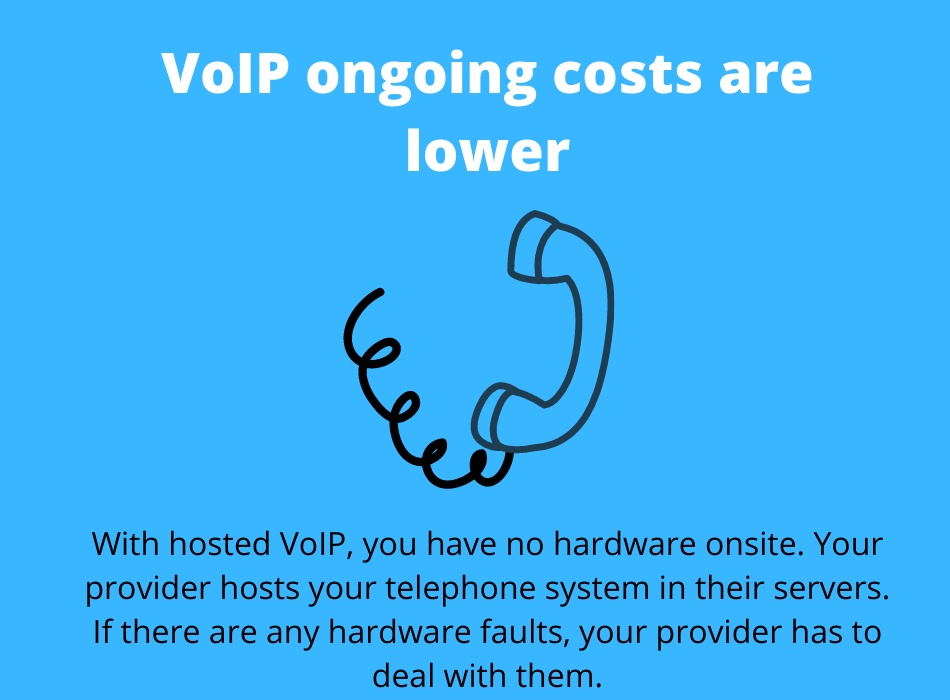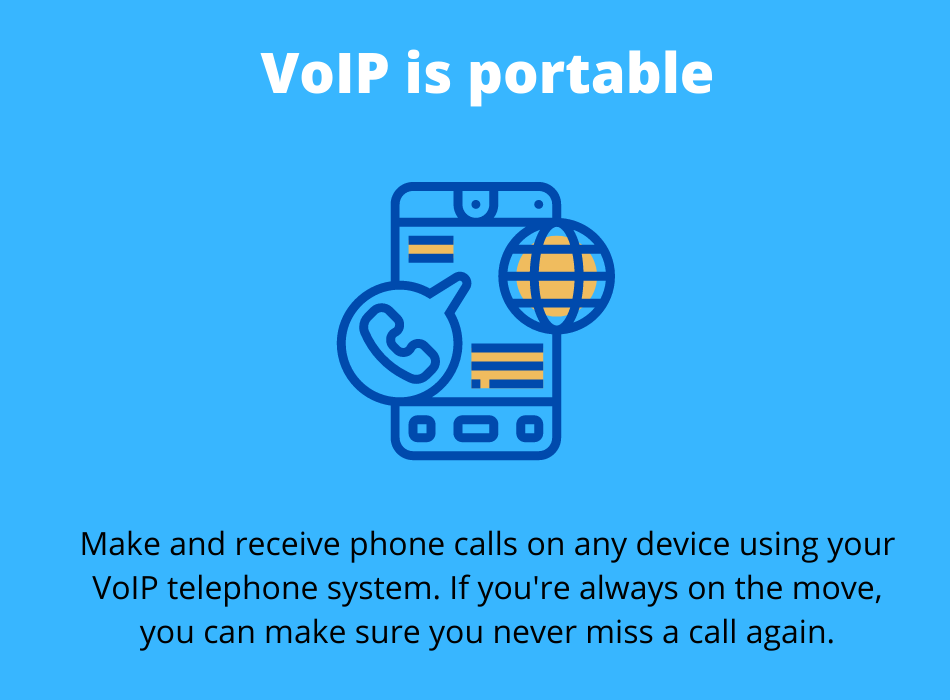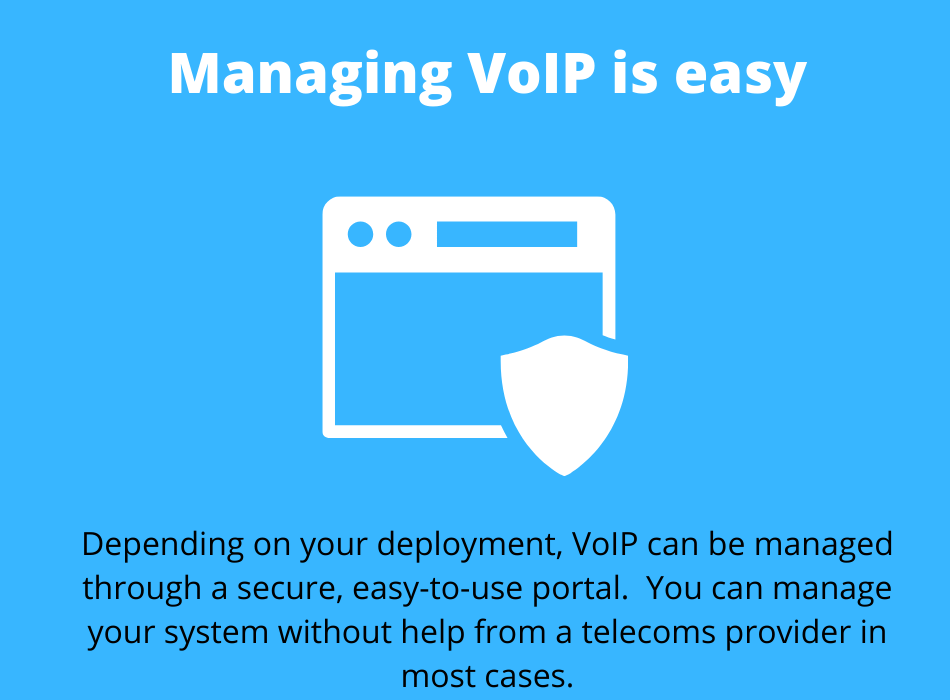Small businesses looking to invest in a telephone system cannot afford to make the wrong decision. Different types of VoIP telephone system are very popular at the moment, but are there any benefits of VoIP for a small business?
Here are the main benefits of VoIP for small businesses:
- Lower costs
- Portability
- Greater scalability
- More features
- Easy management
Now you know all the popular buzz phrases for why VoIP is a good option for small businesses, let’s take a look at what these benefits mean to the businesses that use them.
Lower Costs Of VoIP
Businesses of any size need to keep a close eye on costs, but expenses can be a more pressing issue for small businesses. So to allay any fears about how much VoIP costs, I’ll start off by saying VoIP can save your business a lot of money!
Moving over to VoIP can save your business money in numerous ways.
- Lower equipment costs
- Lower call costs
- Lower ongoing maintenance costs
According to IT World, switching to VoIP can save small businesses up to 45% each month when compared with traditional phone services. But where are you actually saving money? Let’s break it down.
Lower Equipment Costs
With traditional telephone systems, there is a massive upfront cost. For traditional telephony, you need to purchase a PBX, which is a very expensive piece of hardware.
A PBX can cost your business thousands of pounds upfront. Many will say, perhaps correctly, that a PBX will save you money in the long run. However, how is a small business meant to afford thousands of pounds upfront for a telephone system?
For small businesses, VoIP is often deployed in a manner that requires little to no hardware.
For most small businesses, VoIP will be deployed in a manner that requires little to no hardware. As long as you have broadband and internet-enabled devices, you have everything that you need for a voice over IP telephone system. Depending on your setup, it might be advisable to also purchase IP phones. However, this isn’t a necessity. And even if you need them, some providers will bundle them in with your monthly cost so that you don’t have to purchase anything upfront.
With a hosted PBX, which is the ideal option for the vast majority of small businesses, your provider looks after all the servers for you. You don’t have to purchase any equipment at all, so the upfront costs are kept to a minimum. it’s possible there won’t even be an installation fee depending upon the deployment that you go for.
Lower Ongoing Costs
As well as upfront costs, it’s important to consider recurring costs as well. Is it worth investing in a traditional telephone system to save money in the future? No, a traditional telephone system will typically have higher recurring costs than VoIP too.
On average, a VoIP licence will cost £15 per month. Some providers will charge less, while others will charge more.
On the other hand, a traditional phone line will usually cost around £30 – £45 per month. So by moving over to VoIP, you can save a fortune every month.

If you have a traditional telephone system, it’s likely that you will have more maintenance costs too. Because you are responsible for looking after your own hardware, you’ll have to pay engineers to maintain it for you. If you have any hardware difficulties, you’ll have to pay professionals to come and have a look at the issue for you. With hosted VoIP, you don’t have this issue as your provider looks after all of the hardware for you. You pay a small monthly charge for support and maintenance and that’s it.

VoIP Portability
A traditional telephone system is rooted in your office. The PBX is literally in your office. In a world where flexibility is arguably more important than ever, small businesses in particular require a system where portability is a key benefit.

Portability is one of the key selling points of a Voice over IP telephone system. Because VoIP numbers are virtual, they can be pointed to any number on demand. So if you are working at home one day, you can point all your calls to your home phone.
Furthermore, you can make and receive calls on any internet-enabled device using your voice over IP telephone system. For example, you can download an application on your laptop that allows you to make and receive calls through it.
A traditional PBX can only be used when you are in the office. So how many calls are you missing when you are away from the office?
For small businesses where employees are regularly on the move, a VoIP telephone system offers the flexibility that you need to ensure you never miss a call. On the other hand, a traditional PBX can only be used in your office. So how many calls are you missing when you aren’t working in the office?
Greater Scalability Of VoIP
It’s a well-known fact that traditional telephone systems can be very costly to upgrade. Once you outgrow your equipment, or you need more lines, it requires another big investment. This is a problem that you avoid entirely with VoIP, because VoIP technologies have been designed with easy scalability in mind.
With VoIP, as your demand increases, you can:
- Add new lines whenever
- Add new call management features
- Expand your capacity for concurrent calls
Changing things with your VoIP system, such as the number of users you have, won’t require massive investment. You – without the help of a telecoms specialist – can make changes to your system within a matter of minutes. Depending on your provider, these changes can even be made temporarily to cope with additional demand.
VoIP grows easily with your business. Add new lines whenever you need them, or increase your capacity for concurrent calls within mere minutes.
More Features Of VoIP
VoIP telephone systems come with a host of features that you’d have to pay extra for if you had a traditional telephone system. In fact, some of these features aren’t available with a traditional PBX at all. For example, the following features are usually available as standard:
- Call waiting
- Auto attendant
- Conference calling
- Call transfer
- Group ringing
- Voicemail
These are just some of the features that are usually included as standard with a VoIP telephone system. There
Easy Management
One of the biggest benefits of VoIP is how easy to manage it is. Depending on the setup of your system, anyone can manage it even without any prior experience.

For most small businesses, VoIP will be deployed in such a way that allows you to manage your system through a secure, easy-to-use portal. Through this portal, you can make changes to your system, such as configuring call diverts and adding new users.
Most providers will offer training that shows you how to use this portal, but it isn’t needed in most cases. Although no two providers are the same, and therefore nor are their portals, the vast majority of web interfaces that you’ll use to manage VoIP are self-explanatory.
Being able to manage your own Voice over IP telephone system is a big benefit. It can help you to save on the costs of paying somebody to manage your telephone system for you. Some businesses spend hundreds and thousands of pounds on the maintenance of their telephone systems. With some VoIP deployments, you can handle everything yourself and potentially save a fortune.
